

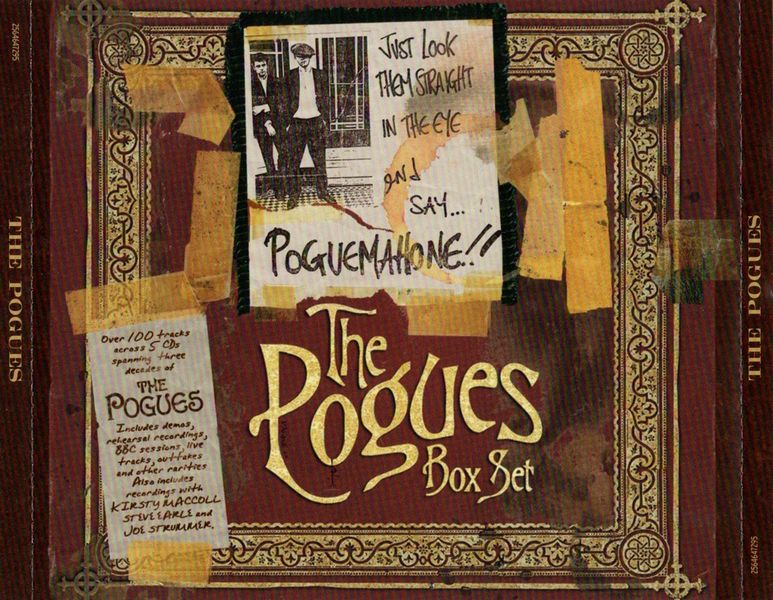 |
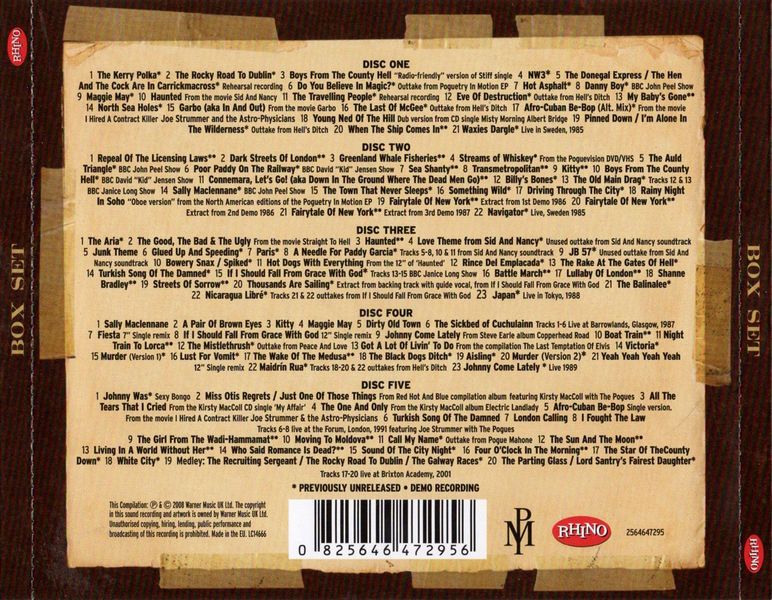
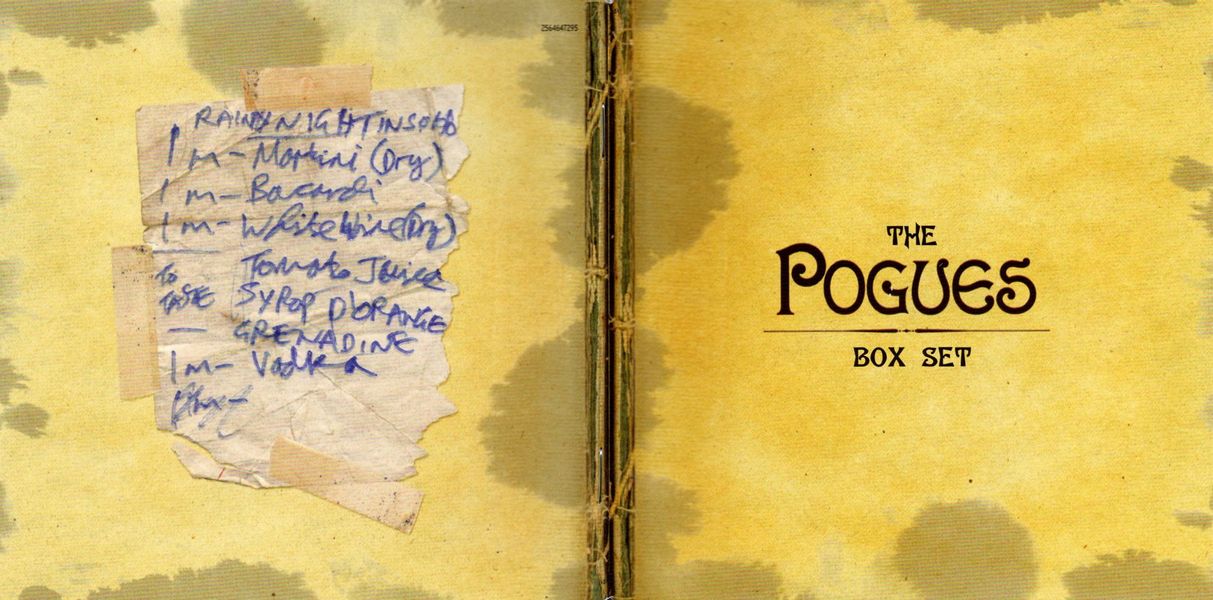
|
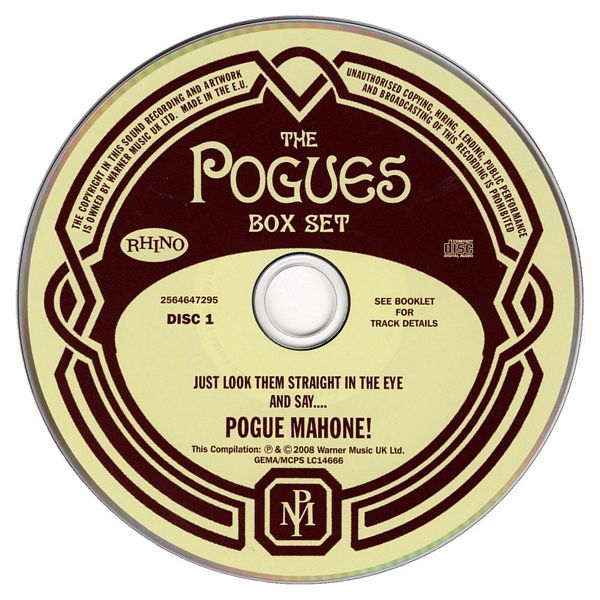
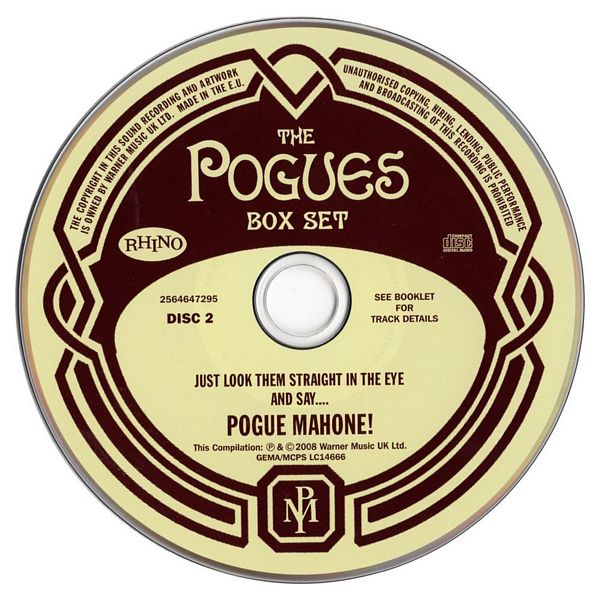
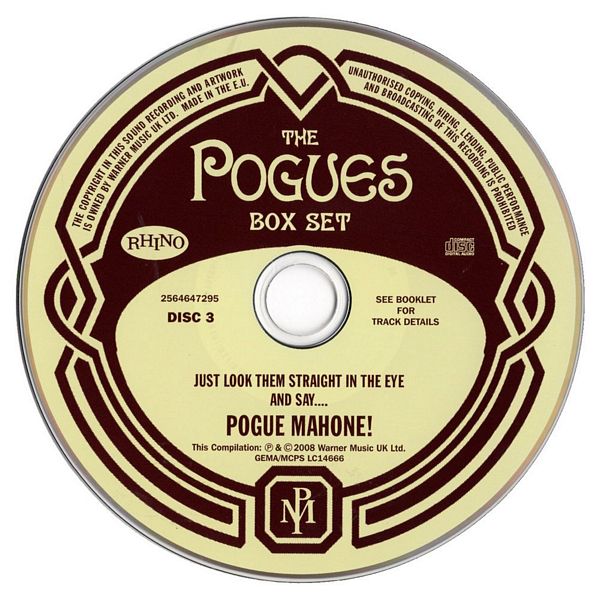
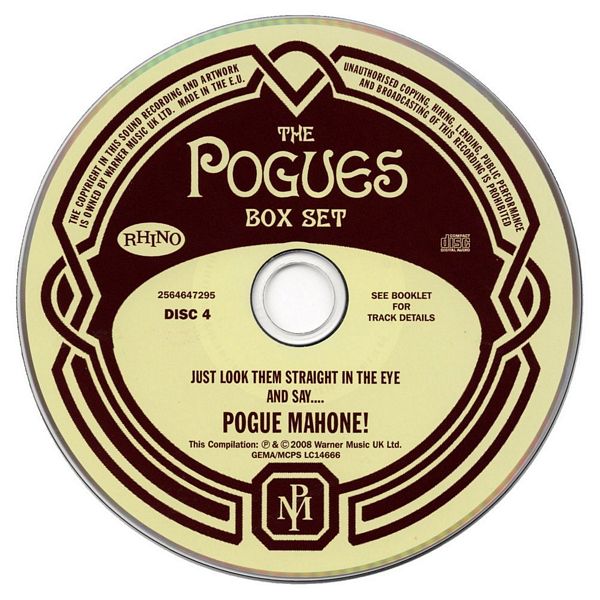
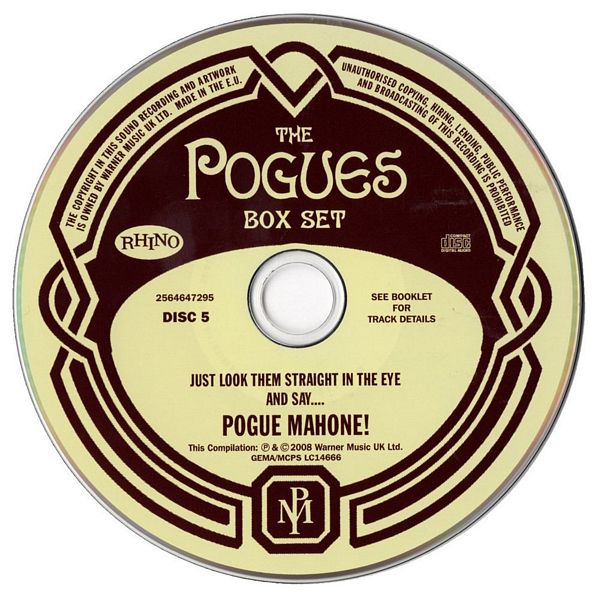 |
| more images |
Sleeve Notes
Philip Chevron emerges from beneath a pile of old tapes and diaries to piece together the Pogues' hidden legacy.
So what's all this then? A bunch of dodgy Pogues tracks that did not merit release at the time they were made? Well, that is inevitably true of some of them, though there's always the hope that time and an apparently finite body of work will have added some lustre or curiosity value to even those hapless orphans. But it doesn't tell the whole story. Suppose you record a couple of tracks like Ewan MacColl's "North Sea Holes" and "Hot Asphalt" [Disc One] as demos for an intended Pogues album which never gets made? You never do record the intended "master" version of such songs because the shape of the album you do go on to make has shifted considerably. What does that make your "demos"?
Well, I suppose it renders them no longer demos but Lost Masters, as they appear nowhere else in the Pogues' catalogue. And we found the Pogues archive, when we finally got around to scrutinising it, turned out to be full of just such items. Before, between and even during the making of our seven studio albums, there was this constant restlessness to try out new things, redevelop older ideas, and generally just try to figure out if there were any round holes which cried out to be plugged with square pegs. Some tracks were more successful, or at least more rewarding, than others. Some found themselves in the position of being helpful to the band's development without ever seeking exposure on their own account (or in any event, not at the time they were made). Some were, simply, just fun things to do.
There are some tracks on this set about which none of us remembers very much. Nobody is quite sure, for example, why we set up a mixing desk and a Revox at our rehearsal room in North London and recorded a new song by Shane, "The Donegal Express" and another Ewan MacColl classic "The Travelling People" [both Disc One], but we're glad we did, as the results have a sort of earthy authenticity we are widely supposed to have outgrown by 1990. A 10" bootleg single of these tracks surely qualifies as the rarest Pogues record ever. We don't know how many acetate copies were made up, complete with special labels, but I have managed to establish that there is one copy in Germany and another in Japan, and I know this because it is the near-pristine Japanese copy we borrowed to dub from for this collection — it is so obscure that we did not even have a tape ourselves, nor have we been able to discover how it reached the hands of the bootleggers in the first place. Also into this category come such curios as "Maggie May" [Disc One], "The Aria", "Rince Del Emplacada" [both Disc Two], and "Lust For Vomit" [Disc Four]. "Johnny Was" [Disc Five] comes from a brief episode in which Andrew, Darryl, Jem, James and myself formed our own support band — "Sexy Bongo" — for just one show in Sweden. We wrote all the material at the soundcheck and performed it that evening, never to be repeated. Our long-serving soundman Paul Scully cannot recall why he taped some of the soundcheck. Blackmail, possibly. The majority of the crowd, incidentally, had no idea who we were.
Some of our songs seemed to follow us around without ever quite finding a home. I think we all felt that "NW 3" was one of Shane's strongest pieces of work and we kept trying to include it in albums but, for reasons that are likely to remain unclear, it was not to be. The version on here [Disc One] is the first recording we have of it, from October 1987, but certainly not the last. By the time we got to working on our fifth album, the Joe Strummer-produced Hell's Ditch, we even finished a strong new backing track of it for that record, but it never got completed. When Shane came down to Rockfield Studios in Wales, he allocated his time there to other ideas — including the remarkable medley of Culture's "I'm Alone in the Wilderness" with his own "Pinned Down" [Disc One]. It is perhaps a mark of how fraught with debate the track-listing on that album became (some of the saga is detailed by Carol Clerk in her biography of the band) that when, at the album's end, I left Rockfield with Joe, a passenger in his old Morris Minor, I was so certain that "Pinned Down / Wilderness" would make the final cut that it never occurred to me it might even need an advocate.
" … the house just wants to rock".
Also from the Hell's Ditch sessions come "Eve Of Destruction", "The Last Of McGee" [Disc One], "The Black Dogs Ditch", the unedited "Maidrín Rua" and the second version of "Murder", as well as an early version of "Aisling", later developed by Christy Moore [all Disc Four]. But we cannot represent these sessions fully without mention of the Astro-Physicians. Because Joe Strummer had accepted the job as Producer of the album at the last minute, he found himself having to squeeze a couple of other prior commitments into his time at Rockfield. Among these were the two pieces of music he had promised Aki Kaurismäki for his pitch-black comedy thriller I Hired A Contract Killer. The main song, "Burning Lights" is performed by Joe in the movie but "Afro-Cuban Be-Bop", which is heard over the closing credits, features the Astro-Physicians, an ad hoc band formed especially for the project and containing only the Pogues. It is heard here in two versions, the original movie mix as featured on the flip side of the rare "Burning Lights" single [Disc Five] and a fuller mix, which Simon Willey made later at Lucinda Strummer's request. [Disc One].
But the story rightly begins back in the early 1980s, when the then 6-piece Pogues set down the first recordings of what they sounded like, with the usual calling in of favours, the help of friends and some borrowed recording equipment. What is exciting about hearing the 1983 demos of "Repeal Of The Licensing Laws", "Dark Streets of London", "Greenland Whale Fisheries" and "Streams of Whiskey" [all Disc Two] again 25 years later — apart from the fact that, as I write, all four numbers are still in the Pogues' show in 2008 — is how strikingly they call to mind those heady and unpredictable early shows at the Bull and Gate, the Sir George Robey, the Pindar of Wakefield, Dingwalls, the 100 Club and other London venues where the first Pogues fans gathered to celebrate and toast the health of the almost kinetic force of this band, already the leading lights in an alternative London post-punk scene which, as its almost skiffle-like ethic did not provide the soundtrack the world-weary music paper hacks demanded in this early Thatcher era, received scant media coverage.
By 1984, the demos are starting to sound just a little tidier and, with producer/manager Stan Brennan in tow, the Pogues are cutting the tracks which will persuade Stiff Records to give them a record deal. From this session come "The Rocky Road To Dublin" [Disc One], "Sea Shanty", "Transmetropolitan", "Kitty" and "Connemara, Let's Go" [all Disc Two]. By now, too, The Pogues had embarked upon their sporadic live sessions for BBC Radio, a treasure trove from which we have selected "Danny Boy" [Disc One], "The Auld Triangle", "Poor Paddy On The Railway", "Boys From The County Hell", "Billy's Bones", "The Old Main Drag", "Sally Maclennane" [Disc Two] and "The Rake At The Gates Of Hell", "Turkish Song Of The Damned" and "If I Should Fall From Grace With God" [Disc Three], all recorded at the BBC's Maida Vale studios between June 1984 and October 1986.
The Stan Brennan-produced Red Roses For Me and the Elvis Costello-helmed Rum, Sodomy and the Lash arrived in 1984 and 1985 (neither album providing any outtakes of any kind) and signaled a period of extensive and exhausting touring, around Britain, then in quick succession to Germany, Scandinavia and the rest of Europe and also, by early 1986, the USA and Canada. By the start of 1987, we had come towards the end of a long period in which our recording opportunities were restricted mainly to soundtrack contributions to the Alex Cox movies Sid and Nancy [Disc Three] and Straight To Hell [see the CD Straight To Hell Returns, Big Beat Records CDWIKD 239] and some song demos — "Driving Through The City" — for Grace Jones, along with "Something Wild" and the instrumental "The Town That Never Sleeps", both rejected for Jonathan Demme's Something Wild [all Disc Two]. But although our joint single with the Dubliners, "The Irish Rover" was our first Top Ten hit in the UK, the long deliberations which would see our Stiff Records contract effectively bought out by Warner Music had not yet come to an end. Stiff was a flag of convenience at that point. But we also had to be circumspect about what and where we recorded, as there was always the risk that the tapes could be held hostage by one or other of competing legal factions. Before the Dubliners single, MCA released a single from Sid And Nancy, "Haunted" [Disc One] and a Stiff single from the Straight To Hell soundtrack, "The Good, The Bad and the Ugly" [Disc Three], though it was not actually in the movie, was scheduled and cancelled.
And so it was that, in early 1987, we snuck into EMI Studios at Abbey Road in London to record what was being billed as The Terry Woods Solo Album but was in fact demos for the next Pogues album. It was perhaps the worst kept secret in the London music biz at the time, but we kinda dug the subterfuge anyway. The Abbey Road tapes, because of the mythology which surrounds them, are widely supposed to be some sort of Pogues holy grail but actually, they yielded up surprisingly few goodies for this box set. In the main, they are are just not-as-good versions of the recordings we would, within three months, and with Steve Lillywhite in the Producer's chair, begin to make in RAK Studios just down the road, for what would become If I Should Fall From Grace With God. In all but a couple of cases, Shane is still working out the lyrics, so the guide vocals are, in consequence, quite messy. But we have rescued "The Kerry Polka" [Disc One], a version of which later became part of "South Australia", and early drafts of "Battle March", "Streets Of Sorrow", "Shanne Bradley" and an experimental "Lullaby Of London" [Disc Three], as well as a section of the final demo of "Fairytale Of New York".
"'twas a wild Christmas Eve … on the West Coast of Clare"
If "NW3" made periodic returns to the recording studio without resolution, "Fairytale Of New York" [Disc Two] had a somewhat happier journey. We worked on earlier versions, with producer Elvis Costello, around the time of, and soon after, our work together on the Poguetry In Motion sessions. Poguetry, an exceptionally strong E.P. by any standards, would also render up the outtake "Do You Believe In Magic?" [Disc One] and the alternative "oboe" mix of "Rainy Night In Soho" [Disc Two], which was replaced on the E.P. by the better-known "flugelhorn" mix everywhere except North America. (The "Rainy Night" saga did not, in itself, conclude there. In 1991, Steve Lillywhite provided a new version combining fresh recording with elements of the earlier two). The Poguetry sessions had been, in the main, happy and successful, but small fissures were beginning to emerge in Shane's relationship with Elvis. So It's hard to tell, in the first two demo extracts (Costello plays piano on the first demo and bass on the second) how far the project could reasonably have progressed with that combination of talents. What is clear, however, is that the piece itself still needed work before it would become the most beloved Christmas song of all time. By the time we hear the third demo extract from Abbey Road in 1987, most of the elements seem largely intact, except the as-yet unscheduled Kirsty MacColl factor. By now, just months before the song is recorded in earnest, you sense a fresh confidence in the work that cannot just be caused by the fact that we have kicked it up a tone, from C to D.
The Fall From Grace album did have a couple of outtakes, in the form of "The Ballinalee" and "Nicaragua Libré" and also from those sessions, you get to hear some of "Thousands Are Sailing" with the composer's original guide vocal, from which Shane learned, or at least adapted, the song [all Disc Three]. "The Mistlethrush" [Disc Four] is from the cutting room floor of album number four, Peace And Love, though long-rumoured lengthy acid-jazz workouts from those sessions do not actually exist. "Call My Name" [Disc Five] is the only outtake from 1995's Pogue Mahone that has not already surfaced. Also of some interest, we hope, are demos preceding the Peace And Love album — in the form of "Boat Train" and "Night Train To Lorca", and the Hell's Ditch album — "Victoria", "Murder" and "The Wake Of The Medusa" [all Disc Four]. The Waiting For Herb album is represented by demos of "My Baby's Gone" [Disc One] and "The Girl From The Wadi-Hammamat" and an instrumental, "Moving To Moldova", a version of which later, with lyrics, became the epic "Drunken Boat" [both Disc Five]. The demos for the final Pogue Mahone album are almost a chapter in themselves, but are marked here by "The Sun And The Moon", "Living In A World Without Her", "Who Said Romance Was Dead?", "Sound Of The City Night", "Four O'Clock In The Morning" [all Disc Five] and "When The Ship Comes In" [Disc One].
"He was a miserable skinflint, an affliction and a sore"
But in addition to all these curios, we have also found room for some previously released items which resisted, for one reason or another, inclusion on the remastered and expanded versions of our albums which we released in 2004, UK), 2005 (Japan) and 2006 (USA). The "radio-friendly" version of "Boys From The County Hell" [Disc One] did nothing to propel that particular single into the Top 40, but it did set down the first marker in a long-running squabble between the Pogues and the British broadcasting establishment about lyrical propriety. This reached its nadir in December 2007 when, after 20 years of generous airplay which had helped the single "Fairytale Of New York" into the Top 40 on five separate occasions (all but one of them in the Top 5), the BBC suddenly developed qualms about the words "scumbag" and "faggot". It was a preposterous and short-lived ban, and one which, we were delighted to discover, caused even more music fans to buy or download the track, but here's where the whole sorry saga began — a squeamish, though perhaps slightly more substantial objection to the words "he was a miserable bollocks and a bitch's bastard's whore". By the time the band recorded a version of the song for the David Jensen radio show in 1984 [Disc Two], Shane had begun to substitute just a generally disapproving yelp for the offending Anglo-Saxon words. It's a tough job keeping up with the prevailing morality, not least when you're in the vanguard of those who don't like where the goalposts are. Special singles edits or, indeed, extensions, were made for several of our singles and of these numerous items, we have included the single mix of "Fiesta", the 12" extensions of "If I Should Fall From Grace With God" and "Yeah Yeah Yeah Yeah" [all Disc Four], not forgetting the "dub" version of "Young Ned Of The Hill" [Disc One]. This seemed like a good moment to gather up "Garbo", from the Australian film of the same name [Disc One]. Also present are the tracks we recorded for two charity projects, "Got A Lot Of Livin' To Do" [Disc Four] and, with Kirsty MacColl, "Miss Otis Regrets / Just One Of Those Things" [Disc Five]. La Kirsty also booked us as her band on a session which resulted in "All The Tears That I Cried" and "The One And Only" [both Disc Five]. Two years earlier, Steve Earle had done the same for "Johnny Come Lately" [Disc Four].
There could not, perhaps, be a Pogues Box Set that did not make room for some live recordings, so we have included all six live recordings made at Glasgow in December 1987, which were found dotted around b sides and CD singles for a time [Disc Four]. What a mad week that was at Barrowlands as "Fairytale" climbed tantalisingly to almost the top of the Christmas Top 40! You will also find three selections from the memorable period when Joe Strummer was our lead singer [Disc Five]. Our collection ends with the four selections which, for reasons of space, were omitted from the 2001 live disc on The Pogues: The Ultimate Collection. [Disc Five]. But also, sprinkled around the five discs, are some slightly unusual live recordings not heard before, including a version of Pharaoah Sanders' "Japan" which we only ever played in that country [Disc Three] and our own live version of Steve Earle's "Johnny Come Lately", sung by Spider [Disc Four].
Well, that's it. There's no more. Well, there is actually, but even The Pogues reserve the right to keep private some of our less than glorious moments!